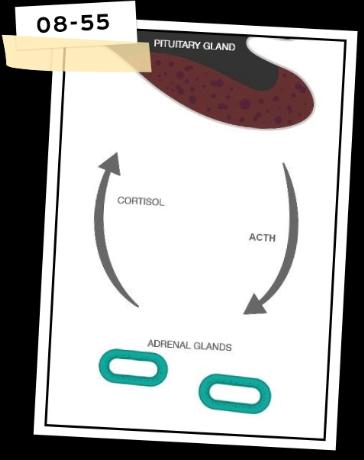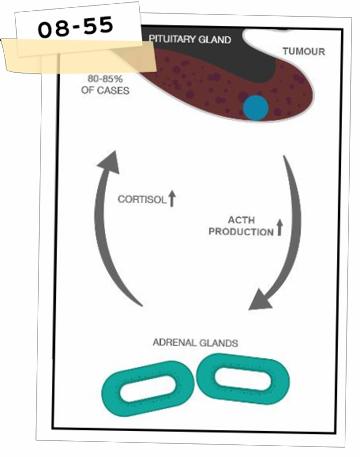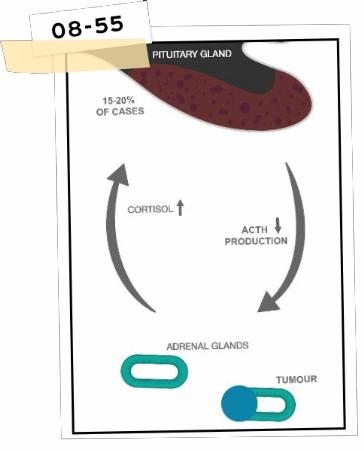Dogs with Cushing's produce excessive amounts of cortisol - an important hormone that helps regulate the body's metabolism. This can have harmful effects on other organs and on the ability of the body to regulate itself.
An investigation into cortisol
Cortisol is produced by two small glands located next to each kidney, these are called the adrenal glands. A hormone called ACTH controls the production and release of cortisol from the adrenal glands. ACTH itself is produced by the pituitary gland – a pea-sized gland located at the base of the brain.
The concentration of cortisol in the blood of a healthy dog varies as the body's demand for cortisol fluctuates. For example, during a period of stress or illness, the production of cortisol by the adrenal glands is increased. Once the period of stress has passed the cortisol concentration in the blood returns back to normal.

Cushing's caused by a tumour in the pituitary gland
As mentioned above, the pituitary gland is located at the base of the brain and is responsible for the production of ACTH, which causes the adrenal glands to produce cortisol.
In the majority of dogs with Cushing’s (80%-85%), a small tumour will develop within the pituitary gland. Most of these tumours are classed as benign or non-cancerous – which means they don’t invade nearby tissue or spread to other parts of the body and are less than 1 cm in size.
The cells of this tumour produce excessive amounts of ACTH which in turn leads to excessive production of cortisol.

Cushing’s caused by a tumour in the adrenal gland
In the remaining 15%-20% of dogs, Cushing’s is caused by a tumour in one (or very rarely both) of the adrenal glands. Where Cushing’s is caused by an adrenal tumour, there is a higher risk that the tumour may be cancerous and therefore your vet may offer you tests to work out which type of tumour is affecting your dog.

Rehabilitation through treatment
Irrespective of the cause of Cushing's, the result is always the same - more cortisol is produced than is actually needed by the body. This results in the slow development of a combination of clinical signs that are associated with the condition.
Treatment is available which combats the excessive cortisol production and for most dogs the prognosis is very good. Despite often being older at diagnosis, with successful treatment, there are many reports of dogs with Cushing's going on to live long and happy lives.
Does Cushing’s cause pain?
It is difficult to know if Cushing’s causes pain in our pet dogs. When turning to humans as a guide, pain isn’t listed as a common clinical sign. However, mood swings, such as feeling depressed or anxious, are a known sign of Cushing’s in people.
As pets are unable to tell us how they are feeling, it is important that if there is a suspicion of Cushing’s, this is acted upon so that any negative impact of Cushing’s is minimised.
Should I worry about my dog’s tumour?
For most dogs, it is not the tumour which causes a change in your dog’s behaviour or appearance – but instead it is the increase in cortisol which has the biggest impact.
In very rare cases, pituitary tumours can expand to be greater than 1 cm in size. Although they are unlikely to invade the nearby tissue, they can push onto the brain. This has the potential to cause signs such as pacing, circling, and in extreme cases seizures and blindness. However, it is important to remember that such cases are very rare, and we would recommend discussing with your vet if you dog starts to display any of these signs.
If your dog is found to have a tumour within their adrenal gland, the incidence of a cancerous tumour is increased when compared to a pituitary tumour.

Suspect Cushing’s symptoms?
Detective Ivana Lead has obtained evidence of Cushing’s symptoms. Watch her interrogate Cushing’s suspects like Leaky Larry, Greedy Gus and others about their symptoms.



